CC Adi 14.42

A.C. Bhaktivedanta Swami Prabhupada
TEXT 42
- “kene curi kara, kene māraha śiśure
- kene para-ghare yāha, kibā nāhi ghare”
SYNONYMS
kene curi kara — why do You steal; kene māraha śiśure — why do You beat other children; kene — why; para-ghare — in others’ houses; yāha — You go; kibā — what; nāhi — is not there; ghare — in Your own house.
TRANSLATION
Śacīmātā said, “Why do You steal others’ things? Why do You beat the other children? And why do You go inside others’ houses? What do You not have in Your own house?”
PURPORT
According to the Vedānta-sūtra (janmādy asya yataḥ (SB 1.1.1)), since creation, maintenance and annihilation exist in the Supreme Absolute, whatever we find within this material world is already in the spiritual world. Śrī Caitanya Mahāprabhu is the Supreme Personality of Godhead, Kṛṣṇa Himself. How is He stealing, and how is He fighting? It is not as a thief or an enemy but as a friend in a loving condition. He steals as a child not because He is in want but out of a natural instinct. In this material world also, small children, without enmity or bad will, sometimes go to a neighboring house and steal, and sometimes they fight. Kṛṣṇa also, like other children, did all these things in His childhood. Without the existence of the stealing propensity and fighting propensity in the spiritual world, they cannot exist here in this material world. The difference between the material and spiritual worlds is that stealing in the spiritual world is done in friendship and love, whereas fighting and stealing within this material world are executed on the basis of enmity and envy. Therefore we should understand that in the spiritual world all these activities exist, but there is no inebriety, whereas in the material world all activities are full of miserable conditions.